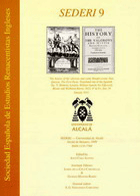| Borot, Luc. Early Journalism in Sixteenth- and Seventeeth-Century England: The Interface between Literature and «Popular Culture» |
41-58 |
|
| Ungerer, Gustav. Juan Pantoja de la Cruz and the Circulation of Gifts Between the English and Spanish Courts in 1604/5 |
59-78 |
|
| Cuder Domínguez, Pilar. «In Stella’s face I read»: Stella as Palimpsest in Sidney’s Sonnet Sequence |
79-84 |
|
| Hernández Santano, Sonia. Corrupted Platonism in Astrophil and Stella: The Expression of Desire |
85-90 |
|
| Cora Alonso, Jesús. Donne’s Holy Sonnet I and Alciato’s Emblem CXXI |
91-122 |
|
| Pando Cantelli, María J. Sonnets, Rooms, Tears and Books: the Poetics of Physical Spaces in Donne’s Love Poetry |
123-128 |
|
| Prieto Pablos, Juan Antonio. John Donne’s Rhetoric of Suspension |
129-134 |
|
| Ribes Triver, Purificación. Religious Struggle in John Donne and Ausiàs March |
135-148 |
|
| Carvalho Homem, Rui. Difficult Ancestors: Modern Irish Poets and their Elizabethan Predecessors |
149-158 |
|
| Relvas, María Jesús. Baltasar Gracián and the Ethics of the Renaissance |
159-162 |
|
| Curbet, Joan. «Changeling love»: The Function of Cupid in Fulke Greville’s Caelica |
163-170 |
|
| Flotats, Rosa. Three and its Content: Thought, Hope, Poetry in Milton |
171-178 |
|
| Sáez Hidalgo, Ana. The Romantic Robert Burton or the Art of Forgery |
1179-188 |
|
| Stone, John. A Gardenist Reading of Andrew Marvell’s «Upon Appleton House» |
189-202 |
|
| López-Peláez Casellas, Jesús. The Enemy Within: Otherness in T. Dekker’s Lust’s Dominion |
203-208 |
|
| Vélez Núñez, Rafael. The Poetical Mind in Ben Jonson’s Masques |
209-214 |
|

